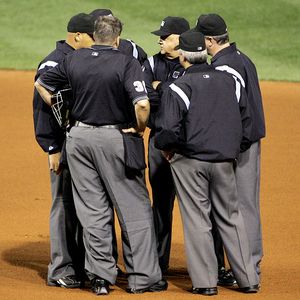
I read yet another article recently on how and why we are losing sports officials across the country. It’s not an unusual topic these days on my social media feeds. I am a youth sports parent, a former athlete, current husband and dad, employee/employer, coach and a baseball umpire. Of those descriptions, my time as an umpire has really changed my views on youth athletics.
When you are watching or even coaching a game in which your child is participating, it’s understandably difficult to not be biased. After all, it’s your son or daughter out there. However as an umpire, you have “no skin in the game,” you are there to arbitrate the contest according to the rules and offer your judgments so that both opponents have as fair of a shot as possible in the outcome. Sounds easy, right?
What is not so simple with being an umpire (or any sports official) is the time, effort and energy spent learning mechanics, rules and situations. After playing baseball my entire life, I began to realize how much I didn’t know about the rules until after I became an umpire. In my 11 years of calling high school baseball games, I estimate that I have read the NFHS and MLB rule books 50+ times. I would bet that some more seasoned umpires would laugh at that number, as they have read these books far more than I.
As a certified baseball junkie, these rule books sit within arm’s reach of “my spot” on the couch as I watch countless baseball games throughout the year. I refer to it often or whenever an odd play occurs – yes, I am a rules nerd, as most umpires tend to be. In addition, I attend umpire chapter meetings for three months every year along with various clinics before I ever step on a field in the Spring. All of this has afforded me a new appreciation of the game and has made me a better baseball coach and youth sports parent.
As I mentioned, being an umpire means you can enjoy a game without a concern for who is the victor. It has also really opened my eyes with regards to a topic we often hear titled “bad parental behavior”. I have witnessed it directed at myself and other umpires, coaches and even some players. When it comes to players, they almost always take direction from how their coaches and parents conduct themselves. Parents who choose to vilify umpires are perhaps unknowingly creating a culture where excuses are acceptable and in fact the norm for their children. I fail to see how this behavior will help their child once they are done playing a game and out in the real world where excuses may eventually get you fired among other things. How did we get to a place in our cultural history within the great game of baseball that any of this behavior is acceptable? What do you think the next generation of parents will act like if we allow this to continue?
Along those same lines, I continually witness parents “coaching” their kids during games – even at the high school varsity level! “Keep your eyes on the ball, tuck in your shoulder, step toward the pitcher, use two hands, follow through” and my all-time favorite: “just throw strikes!” As an umpire and coach, I cringe at these things especially when after every pitch, the kid then anxiously looks over at the parent versus staying in the moment of the game and having fun. I know that these parents think they are helping their child, but after countless personal experiences, I also believe that sadly they are not.
If I sound like I am preaching, maybe I am. My hope is that somehow we change this behavior for the good of the game and most importantly, the kids. Baseball is a hard game that can offer great life lessons that will help prepare our youth for the future. Let the kids fail, cheer them on when they do something great and give the umpires a break so that everybody can enjoy the game. If we don’t change this culture soon, there won’t be anybody left to call balls and strikes.